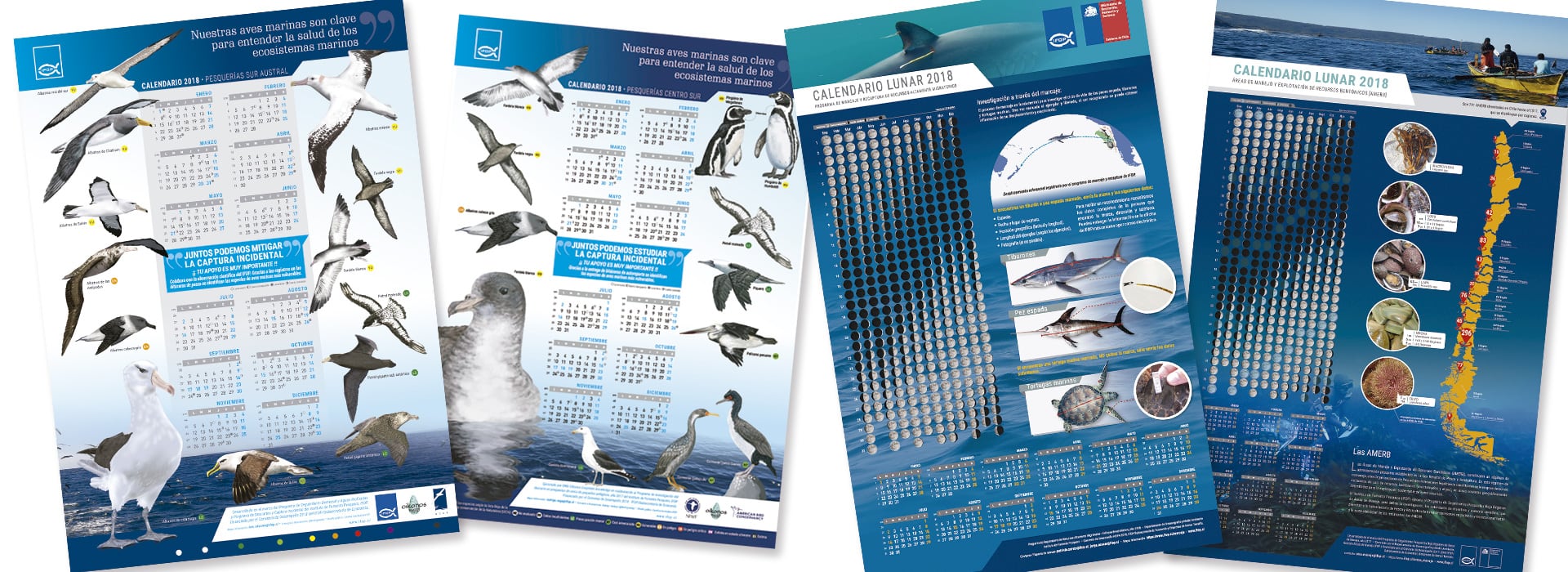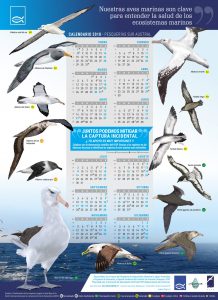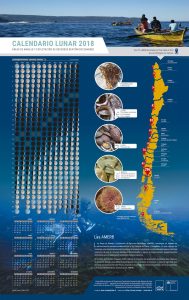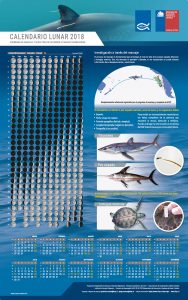IFOP starts a campaign with 6,500 2018 calendars
March 9th, 2018The calendars had great reception by the fishing community, as well as the different government agencies associated with the activity (Subpesca, Sernapesca, etc).
Within the framework of IFOP projects, this campaign aiming to promote the Institute’s activities has been carried out to inform the fishing community about: seabirds’ incidental capture, with 3,000 calendars. Distribution and movement of swordfish, sharks and sea turtles in Chilean waters with 2,000 calendars. Management Areas of Benthic resources interest for AMERBs distribution throughout the country, with 1,500 calendars.
The ecosystemic approach incorporated in current fishing laws has prompted Fisheries Development Institute to develop different research lines in this area, seabirds incidental capture in fishing operations are a growing concern problem for fishery research and administration. Chile has a high interaction between seabirds and fishing operations.
Researcher Luis Adasme on the calendar of seabirds of the southern zone of Chile explained “The need to highlight incidental capture problem as well as to know the most vulnerable to fishing activities sea birds, allows to generate conscience on the importance of carrying out a responsible with the environment fishing activity, this purpose is what encourages both IFOP and its researchers to develop these dissemination campaigns that, through different actions and mechanisms, show and generate changes in different fleets users throughout Chile. Another objective of this campaign is to encourage the fishing community to collaborate and support scientific research by facilitating collection and information registry. ”
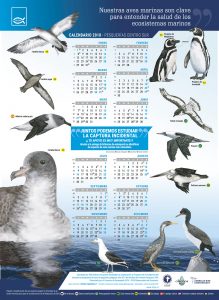
Most purse-seine fisheries vulnerable Seabirds, in northern zone and in the south-central zone of Chile
Researcher Rodrigo Vega, states that the calendars show purse-seine fisheries most vulnerable seabirds groups, in Chile northern zone and in the south-central zone , they are part of a dissemination program aimed at artisanal fishermen communities and fishing industries and its objective is to educate fishermen, so that they can identify by themselves species with greater interaction in each fishery and in this way, to be able to report it in the self-report log, which is one of the instruments used to capture data used in the Discard and Incidental Capture Research Project in Cerco Fisheries of Small Pelagic Fishes.
Researcher Luis Figueroa referred to Management and Exploitation of Bentonic Resources Areas (AMERB), “they are a spatial form of rights of use, which grants exclusive access to fishermen to collect benthic resources within a defined geographical area. This type of systems assumes that success or failure of the administrative measure will depend on care users have of the area and its resources, thus avoiding overexploitation and also becoming a tool for the conservation of marine species, which has been demonstrated by various scientific studies carried out both by IFOP and by different national and international research groups. The calendars will be delivered to different fisher organizations that manage Management Areas throughout the country. ”
Researcher Patricia Zárate about this lunar calendar concluded, “this calendar has been created several times and has been focused on fishermen who are guided by changes of the moon to carry out their fishing activities. In addition, this calendar provides relevant information to the tagging and recapture program with conventional external brands of swordfish, sharks and sea turtles. With the information of the recapture of these marked animals we have learned, for example, that some of the sharks that are present in Chilean waters can reach New Zealand, traveling more than 8000 km away. The success of this program depends to a large extent on the collaboration of the fishing sector, it is the fishermen who are most likely to find these marked animals. This calendar details information that a fisherman should collect when he finds a marked animal, to the delivery of the information and in exchange, IFOP will give each fisherman a symbolic prize for their collaboration. These calendars are already being distributed to the fishing sector, research institutions, education and the community in general from north to south of the country. “.
